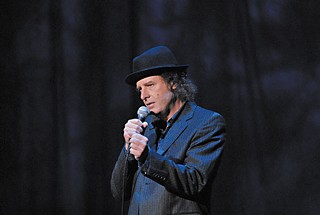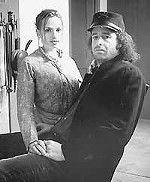Where He Got That Pony
The origin of comedy original Steven Wright
By Robert Faires, Fri., April 27, 2012
If stand-up legend Steven Wright didn't exist, I'm not sure anyone could have invented him. His trademark one-liners – those surreal riffs on everyday expressions and experiences – come out of no comedy tradition the way jokes about politicians and mothers-in-law do. While they share some of the semantic playfulness of George Carlin and the philosophical bent of Woody Allen – two of Wright's heroes in the biz – they're more twisted and refined: Zen koans distilled into comments as precise and brief as a haiku – or better yet, a Henny Youngman punch line. And when he began serving them up in the late Seventies, stand-up hadn't seen a comic so deadpan since Jackie Vernon schlepped the Borscht Belt. Wright was an original, and he continues to be in the fourth decade of a career that has included the comedy recordings I Have a Pony (1985) and I Still Have a Pony (2007); the cable television specials Wicker Chairs and Gravity and When the Leaves Blow Away; the short films The Appointments of Dennis Jennings (which won an Oscar), and One Soldier; and the 23rd spot on Comedy Central's list of the 100 greatest stand-up comics. Prior to his appearance in the Moontower Comedy & Oddity Festival, Wright described his start in the business.
Austin Chronicle: I hear stories from time to time about the Ding Ho, which sounds like a really trippy place to get a start as a comic. Can you describe that a little?
Steven Wright: Well, there were two clubs in Boston in '79. There was the Comedy Connection in Boston, which was more of a traditional comedy club, and then there was this thing in Inman Square in Cambridge. The back of it was a Chinese restaurant, and the front was a stage. It was used for music earlier. It only seated like 100 or 80 people. You know, it was like a folk-music-type place with a big bar in it. One of the comedians, Barry Crimmins, I don't remember how it happened, but he went in there, and the next thing you know, the Chinese guy agreed to try comedy out in the front room. And it had a lot of character, you know, half-Chinese restaurant, half-comedy club. Barry's running it. He never ran a place before. All the comedians are brand new, like maybe some of them had been doing it for two to three years, but most everyone else was just starting. So there was all this new, naive, young energy. It was like being on an island. We were detached. We had nothing to do with show business. There were no managers, no agents. So there was no one there to say, "You should do it more like this." Maybe we suggested things to each other, but there was no one saying what would help you overall. We were just on this island, learning how to be comedians. So all these distinct characters came out of there. Kevin Meaney. Bob Goldthwait. Paula Poundstone. Lenny Clarke. Denis Leary. Steve Sweeney. Barry Crimmins. Don Gavin. You didn't know it then, because sometimes when you're a younger person, you don't realize how special something is while it's happening. Thinking back on it like, seven or eight years later, one of the highlights of my life was that time. There's a movie about it called When Stand-up Stood Out. One of the comedians, Fran Solomita, he directs commercials and stuff now, he made a documentary about what you just asked me. There's footage from then, there's interviews, people talking about that time.
AC: Was it hard for you to find the act as you're known for it now?
SW: No, but it just evolves. It just happens. All I did was try to sit down and write stuff that I thought was funny. That's all I thought about. You go onstage, and you don't know what you're doing. You're your own teacher – you're the student and the teacher at the same time. I did a lot of one-liners right from the beginning, but they weren't all [one-liners], and then, as time went on, I focused more and more on that, but it wasn't like I went, "Oh, I'm just gonna write these things." That's just what happened. And this is how I talk. Onstage, I was very nervous, so I had a blank face, and my monotone was more than it is [now]. So: I'm afraid, I talk in a monotone, I'm sayin' the one-liner jokes – the whole thing just mixed together as a nice combination thing, but nothing was thought out about it other than trying to write funny things. The way I talk, the fact that it meshed well with what I was saying was by accident.
AC: Did you have inspirations – people you thought were funny who helped you find your own sensibility?
SW: Yes! There was a radio show in Boston. I used to listen to the Boston Bruins when Bobby Orr was on the team in the Seventies, and one night I stumbled onto this radio show [where] this guy played two comedy albums every Sunday night. Two entire albums. He'd play a cut from one, a cut from the other – back and forth – until he played them [all]. And I started listening to that. I tuned in every Sunday. And I loved watching Johnny Carson. That's the main reason I wanted to do this. I loved Johnny Carson. I loved him. I loved when [he] talked to the guests. I loved the monologue. I loved the comedians that came out on that stage. So to answer your question: all these comedians on Johnny Carson, all these comedians on this radio show. And my two favorite ones were George Carlin and Woody Allen. 'Cause George talked about just little things that everyone deals with but no one ever even discusses. Everyday things – you know, that really influenced me. George Carlin, he's the best. And Woody Allen had this comedy album. He had stories, long stories, but within the stories there were sometimes jokes within the stories, and those jokes influenced what I did. Wait, wait. George and Woody Allen are the best. Let me clarify.
AC: That AM/FM album of Carlin's was such a breakthrough piece. It felt like such a shift – not just for comedy but the culture overall.
SW: I never thought about it like that. I have to agree with you. That album ... I memorized that album. When I was in high school, I'd come home, put it on – I don't know why I memorized it, I just heard it so many times. When I was in college and had public speaking class, I did something from that album – I think it was the rules to the game show. I said: "This is from George Carlin" – I didn't try to pass it off as me – and I did a thing that I had memorized from high school. And then the guy who went on after me read from the Bible. [laughs] But yes, that album, comedy-wise, it was a big move [for stand-up] – it was like how Saturday Night Live was a big move for sketch comedy. George was a big move [for stand-up]. And then Steve Martin. And Robert Klein. He was even before George, so he was involved in that move, too.
AC: I'm with you. I feel like The Tonight Show still doesn't get enough credit for how much attention Carson paid to comedy. As a kid in junior high and high school, the reason I'd tune in to The Tonight Show was to see George Carlin, Albert Brooks, Robert Klein, Steve Martin, David Steinberg, Steve Landesberg ...
SW: David Brenner.
AC: All those guys who were so new and fresh and doing really different stuff.
SW: All of those guys are in my main time of watching Johnny Carson, too. All brilliant. And none of them are anywhere near each other. In style, I mean.
AC: So what was it like for you actually getting on the show?
SW: It was amazing. It was surrealistic. 'Cause my fantasy was to be a comedian and [to] someday go on The Tonight Show. I had that in my head since I was like 15 years old, 17 years old, when I was watching it all the time and listening to that radio show. So there I am, I'm 26, and I'm there, and I'm backstage, and I got so nervous, I think I got numb. Like, I couldn't be any more nervous, so I had no nerves. And it was amazing. Still the highlight of my entire career is going on that show. You know how that show was perceived, the place it had in show business comedy – sort of go to the mountain, go and visit the king. And have him like you. Talk surrealistic: It's like a kid making believe he's in the World Series for years and years and years, and then he's up at bat in the World Series. That's what it was like.
AC: And you've had a tremendous time since then.
SW: Yeah. My fantasy was to go on there, and then maybe be in a movie, one movie. I never thought what would happen actually would – I never even thought about after that. But the fact that Peter Lassally, producer of The Tonight Show, saw me in the Ding Ho, [and] put me on there; and the fact that Johnny Carson liked me – everything completely changed. It was like a giant fork on the road of not only my comedy but my whole life. I'm so grateful to him. Both of them.
Steven Wright appears Saturday, April 28, 7:30pm, at the Paramount Theatre, 713 Congress. For more information, visit www.moontowercomedyfestival.com.
Courtesy of Jorge Rios










